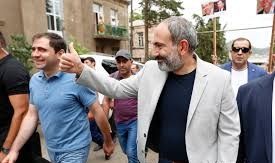|
|
TODAY.AZ / Politics
What secret plans against opposition could be behind Pashinyan's cool behaviour?
02 June 2024 [08:30] - TODAY.AZ

Sometimes he is insulted, sometimes he is kicked out, and sometimes he is applauded by those who pretend to admire him. This trend, which is changing day after day, has already introduced a new face in Armenia - Bagrat Srbazan Galstanyan, someone who is also known as an agent of the former Armenian opposition leaders.
Is he a cleric or a political revolutionary? No one is interested in this. The most interesting thing is the special “program’ that he made or someone made for him to change life in Armenia.
The Armenian Archbishop, who raised all of Yerevan through his Tavush for the Motherland movement, has created a deep rift between the government and the people in the country. As the saying goes, “A blunt knife is a higher cut risk than a sharp one”. Although Bagrat's reputation among the people was not enough at the beginning, today his stubbornness is already starting to create serious risks for Pashinyan. But I wonder if this is really a risk according to Pashinyan, or is he deliberately creating conditions for it?

Much to public consternation, Pashinyan is silent for some reason. In addition to showing himself as an ultra-democrat, he also takes a cold approach to many problems that have arisen in the country. For example, in the north of Armenia, in the vicinity of Lori and Tavush, the consequences and the threat of an epidemic after the flood that occurred last week have become a potential threat to the country. Today, about 300 people were evacuated from the area as a result of the destruction caused by the natural disaster. Another issue is the visits of the Armenian Prime Minister to the provinces as if nothing had happened. He appears in public and tries to show that he is in high spirits. However, the situation in Yerevan is completely different.
Nikol Pashinyan is in the mood to speed up the peace agreement with Azerbaijan. He said this in his statement to the local press in the parliament earlier in May.
"I can say that we have now experienced a significant change in the climate, but it still does not mean that we have reached the finish line; what remains is to sign [the peace treaty]."
In addition, Pashinyan said that he based his hopes on the steps to be taken by the Azerbaijani government and hoped for results from the meetings of both foreign ministers in Alma-Ata.
Nevertheless, the church is completely against Pashinyan's views. They claim that Pashinyan unilaterally makes decisions in favour of Azerbaijan. However, until the Prague agreement and the Alma-Ata declaration, the opposition forces did not have this opinion.
The opposition in the background, and Bagrat Srbazan in the foreground, have already gone so far as to demand Pashinyan's resignation. Pashinyan's extra cold-blooded attitude raises questions about what kind of secret plan he might launch against the opposition, rather than his resignation.
URL: http://www.today.az/news/politics/249088.html
 Print version
Print version
Connect with us. Get latest news and updates.
See Also
- 23 December 2024 [15:19]
Justice Ministry and BSU to collaborate on probationer rehabilitation and support - 23 December 2024 [13:27]
Common map of the Turkic world is being created - 23 December 2024 [12:21]
President: Azerbaijan is one of the unique destinations where different civilizations converge - 23 December 2024 [12:16]
President Ilham Aliyev sends congratulatory letter to Pope Francis - 23 December 2024 [12:12]
Azerbaijan’s strength lies in preserving multiculturalism and national values, says chairman - 23 December 2024 [12:05]
President Ilham Aliyev: Our country free from discrimination or conflict on religious grounds - 23 December 2024 [11:11]
Gloveman: Macron and his one-time premieres - 23 December 2024 [11:00]
Pashinyan plants a pig for the Armenians - 23 December 2024 [10:22]
Azerbaijani Foreign Minister visits Serbia - 23 December 2024 [10:00]
Shusha welcomes returning IDPs
Most Popular
 IDPs return to rebuilt Shusha as part of Great Return State Program
IDPs return to rebuilt Shusha as part of Great Return State Program
 Pashinyan plants a pig for the Armenians
Pashinyan plants a pig for the Armenians
 Azerbaijan, Russia inks agreement on Development of Transit Freight Transportation
Azerbaijan, Russia inks agreement on Development of Transit Freight Transportation
 Sweden's Climate and Environment Minister calls for Shein and Temu to be banned in country
Sweden's Climate and Environment Minister calls for Shein and Temu to be banned in country
 President Ilham Aliyev's remarks in his interview with Dmitry Kiselev in spotlight of world media
President Ilham Aliyev's remarks in his interview with Dmitry Kiselev in spotlight of world media
 China and Pakistan hold joint anti-terrorism exercises
China and Pakistan hold joint anti-terrorism exercises
 S. Korea to launch 3rd homegrown military spy satellite
S. Korea to launch 3rd homegrown military spy satellite
